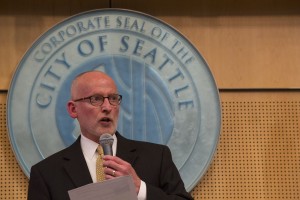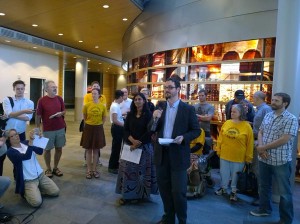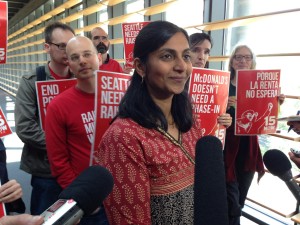With a new district voting system and 47 candidates running for nine seats, the next Seattle City Council will be full of new faces. But the question is: will we have a council in 2016 with the same old big business policies, or a genuine change in course with a bold working-class agenda?
In just two years, socialist City Councilmember Kshama Sawant has had a major impact on the political landscape in Seattle. Elected without a dime of corporate cash, Sawant led the way in winning the highest minimum wage in the country in her first six months in office. Along with raising the wages of 100,000 workers, Seattle was the first major city in the country to set a pathway to a $15/hour minimum wage, which is now spreading across the country at lightning speed.
And it wasn’t just minimum wage. When the Seattle Housing Authority proposed a draconian rent increase of 400 percent on low-income renters, Sawant helped organize tenants and together they defeated it. When most City Councilmembers left Seattle to discuss the City budget at a luxury resort with the Chamber of Commerce and corporate executives, Sawant stayed in Seattle and brought together unions and community organizations to win millions of dollars in additional funding for a women’s shelter, city workers’ wages, and essential services for the homeless.
Sawant would not have been able to achieve any of this without the movements of fast food workers, the impact of Occupy Wall Street, and the grassroots support of thousands of people in Seattle.
Socialist Alternative members provided the backbone of her election campaigns, along with the building of 15 Now and the various fights that Sawant led. Sawant has had the critical advantage of being supported by, and being a member of, an organization that clearly saw new openings for socialist and independent politics in the first place, along with the potential to build a movement for the bold $15/hour demand. The pressures on those elected to office are all too real, and Socialist Alternative provides political support to help stand up to these pressures.
It is hugely important for the fight for 15, labor unions, the socialist movement, and the broader Left that we make sure Kshama Sawant is re-elected in District 3. But in the view of Socialist Alternative, to really challenge the corporate establishment, the decisive question is the building of a new political force based on fighting for working people and drawing together socialists, unions, and progressive activists.
Conservative Majority on the City Council
With every council seat up for election this year because of the new district voting system, the question of who will make up the City Council next year especially matters. And big business knows this.
Already, more than $200,000 of corporate PAC money is flowing to candidates from notorious groups such as the Chamber of Commerce, the Washington Restaurant Association, the National Association of Realtors (a national lobby group for real estate interests), NAIOP (a commercial real estate industry lobby group), and the Rental Housing Association (the biggest lobby group for Seattle landlords). One of Sawant’s opponents has received a combined $100,000 in maximum donations from a whole litany of corporate executives, developers and business interests (RunForTheMoney.org).

The present conservative majority on the City Council, led by Council President Tim Burgess, who the Stranger called Seattle’s Tywin Lannister, has enabled this situation. Burgess (Citywide District 8) along with Sally Bagshaw (District 7), Jean Godden (District 4), and Bruce Harrell (District 2) – who are all running for reelection – most definitely deserved to be kicked out of office this fall.
They represent everything that is wrong with the Seattle political establishment: wealthy, arrogant, complacent, and just enough of a social conscience and “progressive” rhetoric to mask the fact that they serve the huge corporate and real estate interests that dominate Seattle.
They all voted in favor of the Bertha Boondoggle (Seattle’s disastrous tunnel project) and the billions in taxpayer money being wasted. Despite an urgent housing crisis, these council members have worked to block passage of an essential measure (called a “linkage fee”) to make developers immediately pay for affordable housing through a fee on new development.
Most recently, unelected Councilmember John Okomoto (he was selected by the Council with a 5-3 split vote to replace resigning Councilmember Sally Clark) has devoted himself to stopping Councilmembers Sawant and Licata’s resolution which simply calls on the State government to end its ban on allowing cities to regulate rent.
The conservative majority opposed progressive funding proposals for transit moved by Councilmembers Licata and Sawant, and they opposed the initiative of unions to pay preschool teachers $15/hour. They have been apologists for the Seattle Police Department’s abusive and racist policies and resisted the efforts of the federal government to step in and reform the SPD.
During the debate on the minimum wage, they pushed through all the loopholes that benefited business, including the long phase-in and the reestablishment of the “tip penalty,” which allows employers to pay sub-minimum wages by crediting tips toward restaurant workers’ pay. The tip penalty was outlawed at the State level long ago. It disproportionately affects women and will widen the gender pay gap, which in Seattle is already the worst in the nation.
Alternative Candidates

There are a batch of progressive candidates running for council positions this year on a broadly anti-corporate, anti-establishment basis. Many of them have agreed to join Sawant in pushing for a number of progressive reforms to begin to address Seattle’s affordable housing crisis.
Lisa Herbold (District 1), Josh Farris and Tammy Morales (District 2), Michael Maddux (District 4), Mercedes Elizalde (District 5), Jon Grant (District 8), and Bill Bradburd (District 9) all joined Sawant at a press conference on July 29 to announce their shared support for a package of progressive housing policies they pledged to pass in the first year of the new council if they have the majority:
- Making it official city policy to demand Olympia end the undemocratic state ban on allowing cities to set their own rent regulations.
- Making developers pay for the creation of more affordable housing by passing the maximum linkage fee – a fee on new private developments that the City Council has the ability to pass immediately – to generate over $1 billion for affordable housing over the next ten years.
- Passing a tenants bill of rights.
- Using the City’s bonding capacity to build tens of thousands of high-quality, City-owned affordable housing units.
- Preserving existing affordable housing, including requiring one-for-one replacement when homes are demolished to make way for new projects.
- Implementing a principal reduction program to help homeowners facing foreclosure.
A council majority prepared to pass these policies would be a major step forward. While we are eager to work together to support a common agenda on affordable housing, in order to win we will need to go further. Above all, we urge them to use their campaigns, whether elected or not, to help us numerically strengthen grassroots movements and generate renewed interest in left-wing politics, particularly among young people.
To start, this would mean rejecting all donations from corporations and business. In order to help ensure they represent working people – not become another Richard Conlin who was elected with Green Party support and then became a reliable council member for the establishment – we would urge them to take only the average wage of a Seattle worker and donate the rest of the $120,000 council member salary to help build social movements.
Importantly, we strongly disagree with the decision of most of the progressive candidates mentioned above to run for office as Democratic Party candidates (with the lone exception of Josh Farris).
The Democratic Party
A common reason usually given for running as a Democrat in elections is that the Republicans are worse. And very often, they are worse. The Republican’s right-wing agenda, with its climate change denial and homophobic and misogynist stances, promotes the needs of the most rapacious wing of the billionaire class and its attempts to divide working people.
However, the Democratic Party itself is dominated by Wall Street and its interests, and in Seattle the Republicans are practically a fringe group. Like many major cities, Seattle is virtually a one-party town, dominated by the Democratic Party. Yet, the Democratic Party’s leadership in Seattle has a long standing and consistent record of serving the corporate establishment.
In our view, the far-reaching change working families need cannot be accomplished through the framework of the Democratic Party, which is dominated by a leadership tied by a thousand threads to big business.
A decisive task to begin building a powerful challenge to the corporate establishment is for working people, unions, and other progressive organizations to take the bold step today of laying the groundwork for a new organized political force, independent of the Democratic Party and its corporate-dominated leadership.
Such a new force, based on the social power of working people, would represent a huge step forward by strengthening the level of organization, class consciousness and unity of the working class and all others oppressed by capitalism. To be successful, a full discussion would be needed to develop a political program that does not limit this new party to what big business and their capitalist system can afford, but instead is based on a democratic socialist outlook.
Sawant’s two years in office gives a hint of what would be possible with more support behind this approach. Seattle’s historic $15/hour minimum wage was won not because of the skillful negotiations of politicians in backroom deals, but primarily because of the massive pressure from ordinary people outside City Hall.

It was Occupy Wall Street and then strikes by fast food workers that thrust $15/hour into the mainstream of U.S. politics in the first place. Sawant used her position to help build this movement, always reminding people that what could be achieved inside city hall depended on the strength of movements outside city hall.
While Sawant participated on the Mayor’s minimum wage task force and worked to find agreement with unions and other council members, she also helped launch the 15 Now grassroots organization and supported the back-up option of an independent ballot initiative to put enormous pressure on the establishment to significantly raise the minimum wage.
As Sawant’s engagement with the Mayor’s task force has shown, remaining independent of the Democrats does not prevent us from working together with Democrats on issues that help working people.
Transforming the Democrats from Within?
We recognize that there are many rank-and-file Democrats in Seattle, and even some well-meaning elected Democratic Party politicians, who agree with us on many issues and want to see bolder action against corporate politics, but do not agree that a new party is needed.
Many Democrats in Seattle are working to elect Sawant, who calls for a new party, while still working within the Democratic Party with aspirations to transform the Democrats into a party that firmly opposes the agenda of big business.
However, in our opinion, what can be achieved with this approach is severely limited. It is an approach that has been tested again and again for decades, and it has not worked – it’s a dead end.
History shows that what really advances progress for working people is not the actions of the Democratic Party, but mass movements independent of the Democrats. Moreover, the main effect of supporting the Democrats as the lesser evil to the Republicans has been to demobilize progressive workers and youth when the Democrats are in power, enabling the corporate leadership of the Democratic Party to get away with policies that hurt workers and the environment.
For example, the labor movement and progressive activists made major efforts to elect Washington State Senators Patty Murray and Maria Cantwell, yet they were two of the thirteen Democrats that voted in the Senate to approve fast track authority for the Trans-Pacific Partnership trade deal, called “NAFTA on steroids” by many progressives.
The TPP was opposed by the Martin Luther King County Labor Council and other progressive organizations locally because, if passed, it will have a devastating impact on workers. Nationally, over 2,000 unions and progressive organizations “who spanned the base of the Democratic Party,” according to The Guardian, oppose the legislation.
Yet the corporate leadership of the Democratic Party was able to ignore this opposition because there was no real threat that they could be challenged independently at the ballot.
Imagine if the 2,000 organizations that opposed the TPP could come together to run hundreds of independent candidates, rallying the vast majority of people for policies like single-payer health care, free college education, and a major increase in taxes on the wealthy to pay for social programs. But also, with such a powerful social force, we could decisively challenge Big Oil and win a massive jobs program to rapidly move toward clean energy. We could challenge Wall Street’s rotten system and help bring about far-reaching change to improve the lives of millions.
Seattle is positioned to play a leading role in this process for the US left over the next years. Right now, the key task is to re-elect Kshama Sawant. If she is elected again as a socialist who rejects corporate cash, it will raise confidence and speed up the process of building a completely new kind of politics that fights unapologetically for working people. We hope more people will join with us to begin laying this essential foundation for an organized political movement for working people, not corporations.


